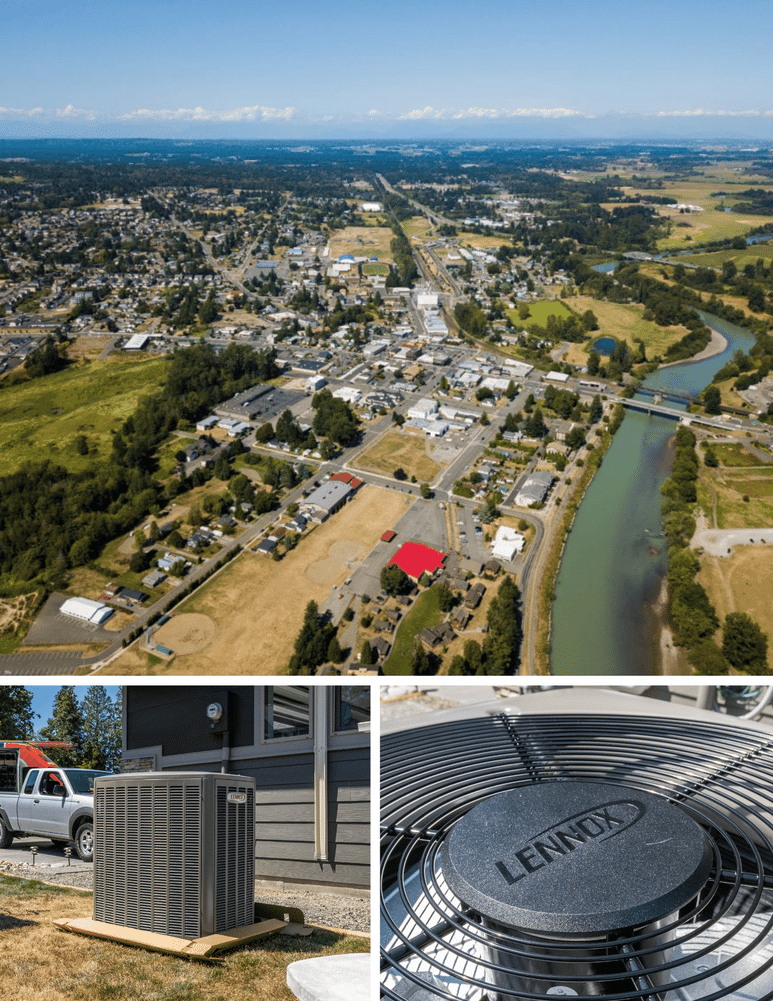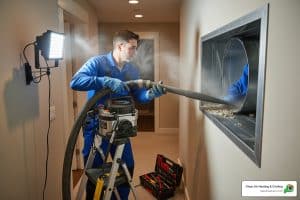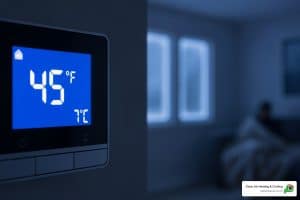Why Choosing the Right Air Conditioning System Matters
When looking for the best Bellingham air conditioning system, you want to consider a few key factors to make sure you’re making the right choice. Here are the essentials:
- Climate Considerations: Bellingham summers can get surprisingly warm. A reliable AC system will keep your home comfortable and protect against heat waves.
- System Types: Choose from central air conditioners, ductless systems, and heat pumps—all with their own benefits and drawbacks.
- Efficiency and Costs: Not all AC systems are created equal. Look for options that balance upfront costs and long-term energy savings.
Choosing the right air conditioning system for your Bellingham home is key to maintaining comfort and efficiency throughout the year. Given the Pacific Northwest’s varied climate, selecting the best AC system can significantly impact your energy bills, indoor air quality, and overall home satisfaction.
I’m Colin Matei, the owner and president of Clean Air Heating & Cooling. With years of experience specializing in Bellingham air conditioning system solutions, I’ve dedicated my career to enhancing home comfort and efficiency in our community.

Bellingham air conditioning system terms to know:
– Bellingham AC maintenance
– Bellingham air conditioning contractor
– Bellingham air conditioning tune up
Types of Air Conditioning Systems
Central Air Conditioners
Central air conditioners are a popular choice for many homeowners in Bellingham. They provide efficient cooling for the entire home through a network of ducts. One of the main advantages of central air conditioners is their ability to cool multiple rooms simultaneously, ensuring a consistent temperature throughout the house.
Efficiency: The efficiency of a central air conditioner is measured by its SEER (Seasonal Energy Efficiency Ratio) rating. A higher SEER rating means better energy efficiency and lower utility bills.
Ductwork: Central AC systems require a network of ducts to distribute cool air. If your home already has ductwork, installation can be straightforward. However, homes without existing ducts may face higher installation costs and complexity.
Installation Cost: The cost of installing a central air conditioner can vary widely. Factors such as the size of your home, the complexity of the installation, and the SEER rating of the unit all play a role. While the initial investment can be significant, the long-term energy savings and improved comfort can make it worthwhile.
Ductless Systems
Ductless air conditioning systems, also known as mini-splits, are an excellent option for homes without existing ductwork or for those looking to cool specific areas independently.
Space-Saving: Ductless systems are compact and can be installed in various locations, including on walls or ceilings. This makes them ideal for smaller homes or rooms with limited space.
Independent Control: Each indoor unit of a ductless system can be controlled independently. This allows for personalized comfort in different rooms, making it easy to adjust the temperature to suit individual preferences.
Energy Efficiency: Ductless systems are known for their high energy efficiency. By cooling only the areas you need, you can save on energy costs. Additionally, they often have higher SEER ratings compared to traditional central air conditioners.
Heat Pumps
Heat pumps are versatile systems that provide both heating and cooling, making them a year-round solution for home comfort.
Year-Round Climate Control: Heat pumps can efficiently cool your home in the summer and provide warmth in the winter. This dual functionality makes them a cost-effective option for maintaining a comfortable indoor environment throughout the year.
Installation Process: Installing a heat pump involves setting up an outdoor unit and connecting it to indoor air handlers. The process can be more complex than installing a simple air conditioner, but the benefits of year-round climate control often outweigh the initial effort.
Energy Savings: Heat pumps are highly efficient, often outperforming traditional heating and cooling systems. They use electricity to transfer heat rather than generate it, leading to significant energy savings. According to the U.S. Department of Energy, heat pumps can reduce electricity use for heating by approximately 50% compared to electric resistance heating.

Choosing the right type of air conditioning system for your Bellingham home depends on various factors, including your home size, existing infrastructure, and personal preferences. Each system—central air conditioners, ductless systems, and heat pumps—offers unique benefits that can improve your home’s comfort and efficiency.
Factors to Consider When Choosing an AC System
Selecting the right air conditioning system for your Bellingham home involves more than just picking a brand or type. Understanding the specific needs of your home and considering factors such as size, energy efficiency, and cost can significantly impact your comfort and savings in the long run.
Home Size and Layout
The size and layout of your home play a crucial role in determining the appropriate AC system. An improperly sized unit can lead to inefficiency and increased wear and tear.
- Proper Sizing: An AC unit that is too large will cycle on and off frequently, leading to higher energy bills and more wear on the system. Conversely, a unit that is too small will run continuously to keep up with cooling demands, also driving up energy costs and reducing its lifespan.
- Efficiency Impact: Proper sizing ensures that your AC system operates efficiently, maintaining a consistent temperature without overworking. This not only keeps your home comfortable but also prolongs the life of your unit.
Energy Efficiency
Energy efficiency is a critical factor to consider when choosing an air conditioning system. More efficient systems may have higher upfront costs but can save you money in the long run.
- SEER Ratings: The Seasonal Energy Efficiency Ratio (SEER) rating measures the efficiency of an air conditioner. Higher SEER ratings mean better energy efficiency. For instance, a unit with a SEER rating of 16 is more efficient than one with a SEER rating of 13.
- Long-Term Savings: Investing in a high-SEER unit can reduce your monthly utility bills. According to the U.S. Department of Energy, upgrading from a SEER 9 to a SEER 14 unit can cut your cooling costs by more than 35%.
- Environmental Impact: Efficient systems use less energy, reducing your carbon footprint. This is not only good for the environment but also aligns with increasing trends towards sustainable living.
Installation and Maintenance Costs
While the initial cost of an AC system is significant, it’s essential to consider long-term expenses, including maintenance and potential repairs.
- Initial Investment: The cost of installing an AC system varies based on the type of system, the size of your home, and the complexity of the installation. For example, ductless systems might have higher initial costs due to the need for multiple indoor units, but they can be more cost-effective in homes without existing ductwork.
- Long-Term Costs: Regular maintenance is crucial for any air conditioning system. Maintenance plans, like those offered by Clean Air Heating & Cooling, can help keep your system running efficiently and extend its lifespan. According to Clean Air Comfort Systems, proper maintenance can prevent costly repairs and improve energy efficiency.
- Professional Installation: Hiring a licensed and certified HVAC contractor ensures that your system is installed correctly and safely. Improper installation can lead to inefficiencies and potential hazards. Professional installation might come with a higher upfront cost but can save you money and headaches in the long run.

By carefully considering these factors—home size, energy efficiency, and installation and maintenance costs—you can choose the best air conditioning system for your needs. This thoughtful approach ensures comfort, efficiency, and long-term savings for your Bellingham home.
Benefits of a Properly Installed AC System
Comfort and Air Quality
A properly installed air conditioning system ensures consistent temperature throughout your home. No more hot or cold spots—just a comfortable, even climate in every room.
Air filtration is another huge benefit. Modern AC systems come with advanced filters that remove dust, dander, and allergens from the air, making it cleaner and healthier for your family. According to Clean Air Comfort Systems, regular maintenance and ductwork cleaning can significantly improve your indoor air quality by removing pesky allergens.
Humidity control is also crucial. High humidity levels can make you feel hotter than it actually is, and can also lead to mold growth. An efficient AC system will keep humidity in check, creating a more comfortable and healthier indoor environment.
Energy Savings
One of the biggest advantages of a well-installed AC system is the potential for lower utility bills. High-efficiency units with good SEER ratings use less energy to cool your home. For instance, upgrading from a SEER 9 to a SEER 14 unit can reduce your cooling costs by over 35%, according to the U.S. Department of Energy.
Eco-friendly options are available too. Many modern air conditioning systems are designed to be environmentally friendly, reducing your carbon footprint. This aligns with the growing trend towards sustainable living.
Increased Home Value
Installing an air conditioning system can increase your home’s value. Potential buyers are often willing to pay more for a home with a properly installed and efficient AC system.
Property attractiveness is improved when your home has modern amenities like air conditioning. Open houses and tours will leave a better impression, making your home more appealing to buyers.
Long-term investment in a high-quality AC system can pay off when it comes time to sell your home. Not only does it improve your living conditions while you’re there, but it also boosts your resale value. Buyers appreciate the convenience of a ready-to-use, efficient air conditioning system, saving them the hassle and cost of installation.
By ensuring your air conditioning system is properly installed, you can enjoy these benefits and more, making your home a comfortable, efficient, and valuable space.
Frequently Asked Questions about Bellingham Air Conditioning Systems
What is the most cost-effective AC system?
If you’re looking for a cost-effective Bellingham air conditioning system, consider a ductless system. Ductless systems, also known as mini-splits, are highly energy-efficient and offer flexible installation options. They don’t require ductwork, which can significantly reduce installation costs.
Energy efficiency is a major advantage. Ductless systems allow you to cool specific zones in your home, so you don’t waste energy cooling rooms that aren’t in use. This targeted approach can lead to substantial savings on your energy bills.
Additionally, the installation flexibility of ductless systems makes them an excellent choice for older homes or spaces where adding ductwork is impractical.
How much does it cost to install AC in Bellingham?
The cost of installing an air conditioning system in Bellingham can vary widely based on several factors, including whether your home already has ductwork.
- With ductwork: If your home already has ductwork, the cost to install a central air conditioning system typically ranges from $3,000 to $7,000. The final price depends on the size of your home and the efficiency of the unit you choose.
- Without ductwork: Installing a ductless system or adding ductwork can increase the cost. Ductless systems generally range from $2,000 to $5,000 per unit, and most homes require multiple units. Adding new ductwork can add another $3,000 to $5,000 to the total cost.
What is the life expectancy of an air conditioner?
The life expectancy of an air conditioner depends on several factors, including the type of system, how well it is maintained, and the quality of the installation.
- Central air conditioners: These typically last between 15 to 20 years. Regular maintenance, such as cleaning filters and checking refrigerant levels, can extend their lifespan.
- Ductless systems: These can last around 20 years with proper care. Their modular design makes them easier to maintain and repair, which can contribute to a longer life.
Maintenance is crucial for extending the life of any air conditioning system. Regular check-ups can help you identify and fix small issues before they become major problems.
Replacement indicators include frequent breakdowns, rising energy bills, and inconsistent temperatures. If your system is over 15 years old and experiencing these issues, it might be time to consider a replacement.
By understanding these factors, you can make an informed decision about the best air conditioning system for your Bellingham home.
Conclusion
Choosing the right air conditioning system for your Bellingham home is a crucial decision that impacts your comfort, energy efficiency, and long-term savings. Whether you opt for a central air conditioner, a ductless system, or a heat pump, understanding the unique benefits and considerations of each option will help you make an informed choice.
At Clean Air Heating & Cooling, we pride ourselves on being your trusted advisor in the HVAC industry. Our expert team is dedicated to providing top-notch service and ensuring your home’s comfort year-round. With over 480 5-star Google reviews, our commitment to customer satisfaction speaks for itself. Plus, our 25% utility savings guarantee ensures you get the most value out of your investment.
We’re here to help you steer the complexities of selecting, installing, and maintaining your air conditioning system. If you have any questions or need assistance, reach out to us.
For more information or to schedule a FREE no-obligation estimate, visit our Bellingham HVAC services page.
Your comfort is our passion, and we look forward to serving you!





